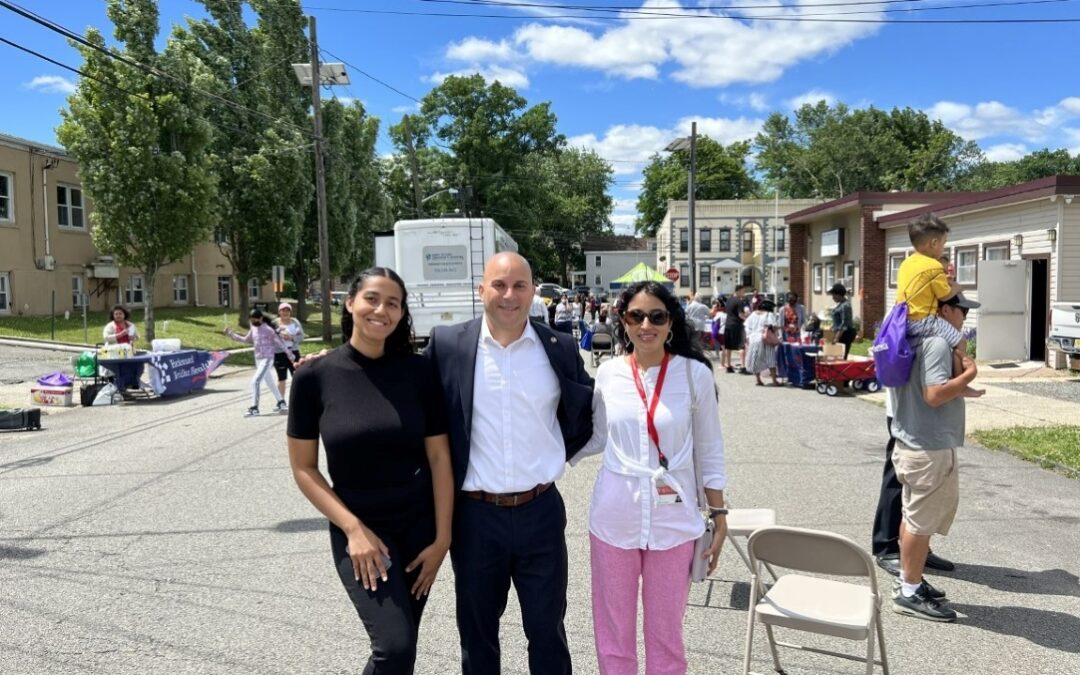On a Saturday in late June, Perth Amboy residents flooded Market Street in front of Iglesia Ciudad de Refugio, a local church. They came for free health services, such as blood pressure, diabetes, and body mass index screenings. Many also received COVID-19 vaccines, as well as referrals and education on several other health topics. Some of the foot traffic was from the food pantry next door, which had helped spread the word among its clients.
Rutgers medical students from the community service organization North American Disease Intervention (NADI) were providing the on-site screenings as part of a health fair organized by Rutgers Global Health Institute in collaboration with multiple local partners. “Easily, 150 people came to the health fair. The NADI volunteers didn’t even get a chance to sit because people kept coming to their table,” says Arpita Jindani, manager of education and training at Rutgers Global Health Institute. “People wanted to know what they should do about their health, how should they lower their blood pressure—basic preventive stuff they didn’t have access to.”
Perth Amboy is a city in Middlesex County with about 55,000 residents, nearly 44 percent of whom are foreign born. It is one of four New Jersey cities across three counties in which Rutgers Global Health Institute has been focused on addressing health inequities.
These efforts are part of Equitable Recovery for New Jersey’s Small Businesses, a program serving low-income and minority communities that the institute started in 2020. Originally, the program was geared toward helping small businesses and nonprofits operate safely and become more resilient during the COVID-19 pandemic. Over time, and because of community members’ input, the program has expanded the services it offers.
“Small businesses employ and serve members of the local community,” Jindani says. “They offer a window into the community’s needs. The health of small businesses and the health of communities go hand in hand, so it makes sense for our program to address both.”
Equitable Recovery program coordinators have organized community-based health fairs in Newark, New Brunswick, Perth Amboy, and Trenton during June and July. These events have offered COVID-19 vaccinations for all ages and eligible doses, preventive health screenings, and many other services that address various needs, both directly and indirectly related to health. Each health fair required the partnership and involvement of nonprofit organizations, community stakeholders, local government, and health care providers. A recent health fair in Trenton offered blood pressure screenings, information and appointments for cancer screenings, and local community resources, such as help with appointments and applications needed to obtain identification. In Newark, optical services were also offered, and in New Brunswick, free dental screenings were provided.
These broad community health events help both to sustain interest in COVID-19 vaccination, which remains crucial as new viral variants continue to cause infection surges, and to address longstanding health equity issues that only worsened with the COVID-19 pandemic. By bringing health services to underserved communities, these events educate community members about the value of preventive health and connect them with local assistance for ongoing care. This ultimately builds community resilience, which is essential to the Equitable Recovery program.
“We can’t let our guard down with COVID-19, but there are so many other health concerns in our communities,” says Richard Marlink, director of Rutgers Global Health Institute. “Whether we are helping with COVID-19, preventive health care, or making it easier for people to put food on their families’ tables and keep roofs over their heads, it’s all about health.”
Pictured above: Rutgers Global Health Institute staff members Solanggy Guillen (left) and Arpita Jindani (right) with Mayor Helmin Caba, who attended the health fair in Perth Amboy.

